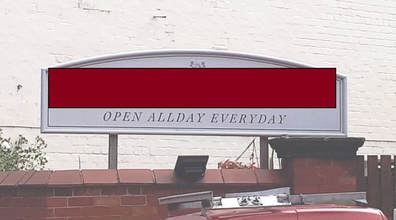|
People often write a single word beginning with ‘every’ or ‘any’ when there should be two words instead. Here’s some guidance to help keep you out of this trap. OPEN ALLDAY EVERYDAY
That’s the proud boast on this sign outside a pub near where I live. Literacy-shaming isn’t my thing, so I’ve masked out the pub’s name – but the sign is a fine example of a common pitfall. Sadly, of those three words, only the first is right. The second isn’t a real word at all. The third is a word, but shouldn’t be used in this way. As Meat Loaf might say: two out of three ain’t bad, but one out of three is a bit poor. (Not that I want to put words into Meat’s mouth, or take them right out of it for that matter. I really hope some of you are getting these references.) An everyday mistake Let’s not dwell on ‘allday’, as this non-word is rarely seen. This usage of ‘everyday’, though, is an easy mistake to make, and it happens often. When used correctly, the single word ‘everyday’ is an adjective, with a similar meaning to ‘commonplace’ or ‘regular’. It doesn’t literally mean that something happens every single day. For example: Washing-up is an everyday chore. These are everyday situations. ‘Chore’ and ‘situations’ are both nouns, described by the adjective ‘everyday’. If we are saying that something happens, and that it literally happens each day, we need two words: The pub is open every day. Every day, he gets up at 7am and takes his dog for a walk. The ‘every day’ in each of the above isn’t an adjective – it doesn’t describe a noun. It tells us something about a verb phrase (‘the pub is open’, ‘he gets up at 7am ...’), so it’s an adverbial (that is, a phrase that acts like an adverb). How to get it right everytime (oops!) Here’s a tip to help with getting this right. Imagine for a moment that the thing you’re writing about doesn’t happen each day, but with some other frequency instead. Would you write ‘everyhour’, ‘everyweek’ or (please, no!) ‘everyyear’? How about a pub sign saying ‘Open till midnight everyFriday’? None of these would be right, and it’s the same with ‘day’. If we use the Oxford, Cambridge and Collins online dictionaries on a best-of-three basis, these are the only words beginning with ‘every’ that are recognised as standard UK English: everybody everyday Everyman everyone everything everywhere Everywoman A common thread among these words is that their meanings are abstract in some way. ‘Everybody’ and ‘everyone’ mean ‘every person’, but we wouldn’t normally refer to a person as a ‘body’ or a ‘one’. As mentioned already, ‘everyday’ doesn’t literally mean that. ‘Everyman’ or ‘Everywoman’ represents a concept of the ‘average’ man or woman – not all men or women. ‘Everywhere’ can’t mean ‘every where’, as it would make no sense: ‘where’ isn’t even a noun. Admittedly, ‘everything’ at least comes close to meaning ‘every thing’ – but it generally means a loosely defined mass of ‘stuff’, not a collection of individual things, whatever ‘thing’ might mean in the context. Any time, any place, anywhere … It’s a similar case with words that begin with ‘any’. Here’s a full list of recognised ‘anywords’ in UK English, chosen on the same basis as before: anybody anyhow anyone anything anytime anyway anywhere ‘Anybody’ and ‘anyone’ are relatives of ‘everybody’ and ‘everyone’. ‘Anyhow’ (meaning the same as ‘anyway’) and ‘anywhere’ have the same quirk as ‘everywhere’ – the second part isn’t a noun. Meanwhile, ‘anyway’ is used in various, er, ways, none of which really means ‘any way’. The one glaring exception is ‘anytime’, which basically does mean ‘any time’ – but the latter is usually preferred. … There’s a wonderful world you can share (OK, that’s enough of the cheesy throwbacks.) It’s worth noting that none of the above dictionaries include ‘everytime’ or ‘anyday’ – not even as informal or US-only words. For US usage, the Merriam-Webster dictionary doesn’t list them either. They do crop up here and there, but are best avoided. Got all that? Good. Time for a Martini …
0 Comments
Your comment will be posted after it is approved.
Leave a Reply. |
Thoughts on Words
An editorial blog. Posts by Graham Hughes. Archives
July 2024
Categories |




